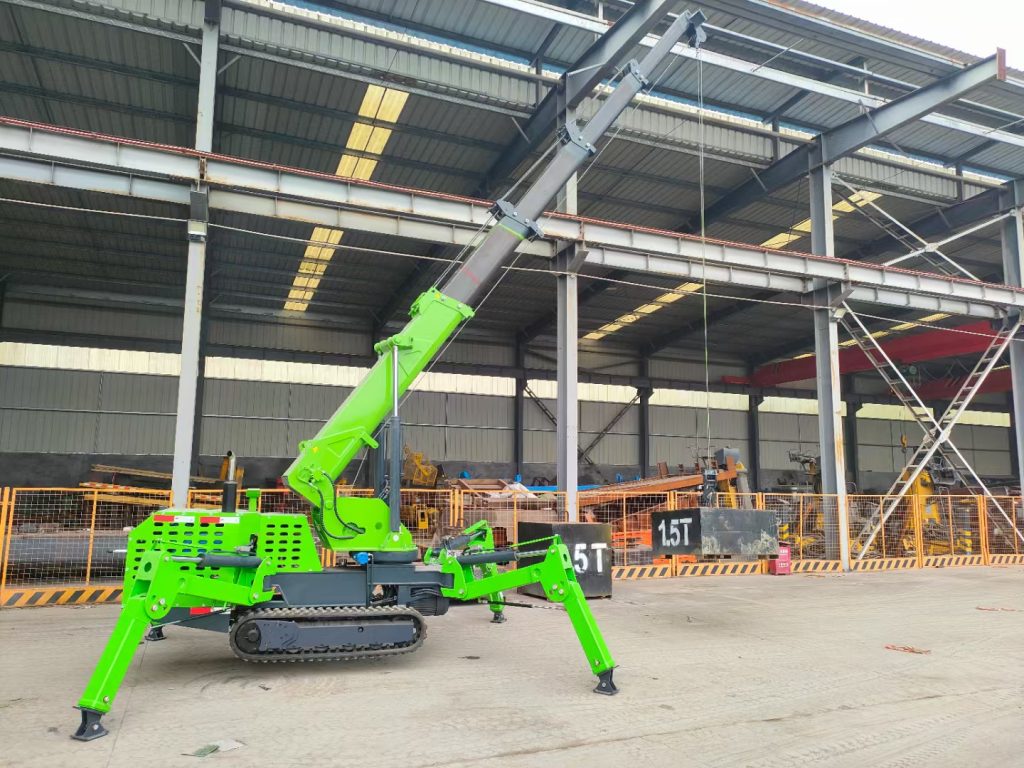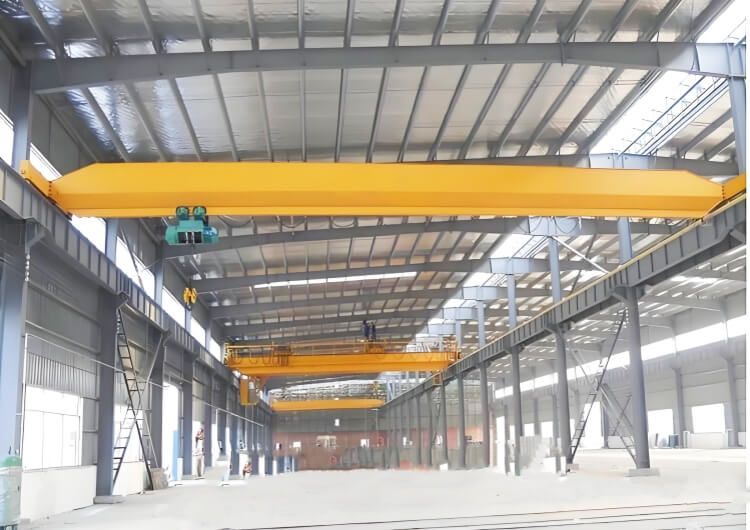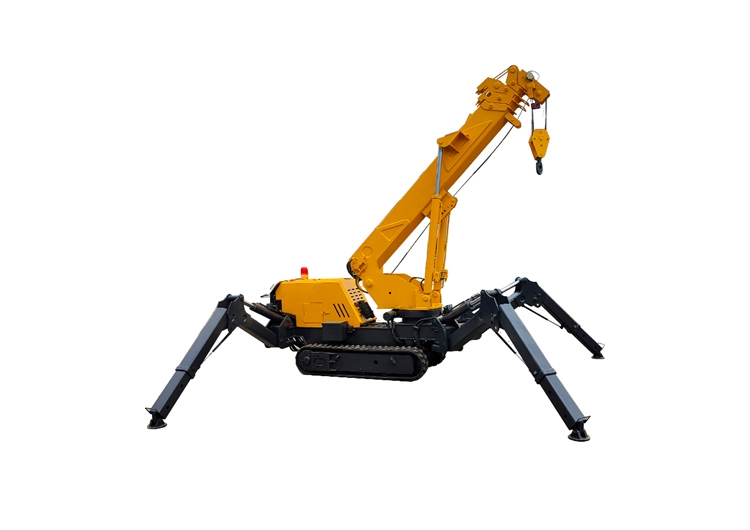GourdType Gantry Crane Usage Environments: Industry Applications and Key Requirements
Gourd type gantry cranes are versatile lifting solutions designed for medium-duty industrial tasks. However, their performance and lifespan heavily depend on proper environmental conditions. This guide explores their optimal usage scenarios, industry applications, and critical environmental requirements.
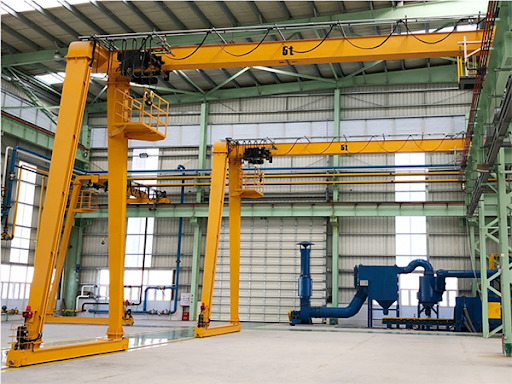
1. Typical Industrial Applications
Gourd-type gantry cranes excel in the following sectors due to their adaptability and compact design:
Manufacturing Workshops:
- Assembly lines for automotive parts, machinery, or electronics.
- Loading/unloading raw materials (steel coils, pipes) in metalworking plants.
Warehousing & Logistics:
- Stacking containers or heavy pallets in indoor warehouses with limited ceiling height.
- Transporting goods in logistics hubs with floor load capacities of 5–10 tons/m².
Construction Material Production:
- Handling precast concrete slabs, bricks, or roofing materials in factories.
- Operating in environments with dust levels below 10 mg/m³ (ISO 23875 standards).
Power & Energy Facilities:
- Maintenance of turbines, transformers, or boilers in power plants.
- Suitable for temperatures between -20°C to 50°C (with optional thermal insulation kits).
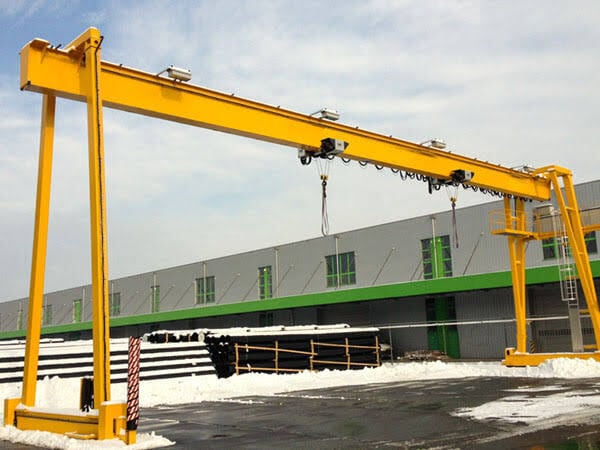
2. Environmental Requirements for Safe Operation
A. Temperature & Humidity
- Standard Models: Perform best in dry environments (humidity <80%) at 0°C–40°C.
- Extreme Conditions:
- For sub-zero temperatures (-25°C), use low-temperature lubricants and reinforced steel.
- In humid coastal areas, opt for stainless steel components or anti-corrosion coatings.
B. Floor & Space Constraints
- Floor Load Capacity: Minimum 5 tons/m² for static loads; 8 tons/m² for dynamic loads.
- Clearance Requirements:
- 0.5m clearance between crane legs and walls/equipment.
- Ceiling height ≥ crane height + 1m (e.g., 6m ceiling for a 5m-tall crane).
C. Air Quality & Hazardous Environments
- Dusty Areas: Install dust-proof motors and enclosed electrical systems.
- Explosive Atmospheres: Use ATEX-certified cranes for zones with flammable gases or particles.
3. Prohibited Usage Scenarios
Avoid deploying gourd-type gantry cranes in these environments:
- Unstable Ground: Soft soil, swamps, or slopes exceeding 2° without proper foundation reinforcement.
- High-Risk Chemical Zones: Areas with acid/alkali vapors (pH <4 or >10) unless equipped with corrosion-resistant paint.
- High-Vibration Sites: Near forging presses or heavy stamping machines (vibration >4mm/s).
4. Customization for Special Environments
Many manufacturers offer modified configurations:
- Explosion-Proof Cranes: For oil refineries or chemical plants (compliance with IECEx/ATEX).
- High-Altitude Cranes: Reinforced structures for plateaus above 3,000m (compensating for oxygen-thin air).
- Food-Grade Cranes: Stainless steel + FDA-approved coatings for meat processing or dairy facilities.
5. Maintenance Tips for Harsh Conditions
Extend crane lifespan in challenging environments with these practices:
- Monthly Checks: Inspect rails for rust in humid climates; clean debris from wheels.
- Lubrication: Use high-viscosity grease in high-temperature workshops (e.g., lithium-complex grease).
- Electrical Safety: Test insulation resistance (>1.5MΩ) quarterly in salt-spray coastal regions.
Conclusion
Gourd-type gantry cranes are workhorses in manufacturing and logistics but demand careful environmental planning. Always consult manufacturers like Konecranes, GH Cranes, or ZPMC to match crane specifications with your operational conditions. Prioritize safety certifications (ISO 12485, FEM 1.001) and environmental adaptability to ensure long-term ROI.
All News
Recent Posts
2025/1/25
2025/2/7
Contact Us Now
Have questions about our cranes or need help?
Reach out to our friendly team for expert support and guidance.
We are here to help you power your journey towards a greener future !
Tel: +8615738677559
E-mail: [email protected]
Whatsapp: +8615738677559
Address: Crane Industry Park, Xinxiang City Henan Provice


